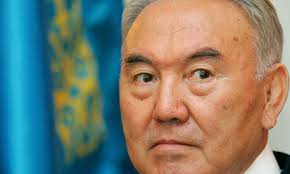 Rakhat Aliyev rose to the height of influence and power in Kazakhstan, marrying the president's daughter and controlling many of the country's major companies. By the time he was found dead in a Vienna jail cell today while awaiting trial for murder, he'd been on the lam from his former father-in-law for eight years.
Rakhat Aliyev rose to the height of influence and power in Kazakhstan, marrying the president's daughter and controlling many of the country's major companies. By the time he was found dead in a Vienna jail cell today while awaiting trial for murder, he'd been on the lam from his former father-in-law for eight years.
Vienna Prison General Peter Prechtl said he assumes it was a suicide. His lawyer said that's unlikely. Prosecutors and police are investigating.
"Aliyev used his position in the president's family and in law enforcement to raid businesses and get control over as many of them as possible," said Oraz Jandosov, a former central bank governor, a founding member of the opposition Democratic Choice party and now director of the Rakurs Center For Economic Analysis. "He clearly wanted to remove Nazarbayev and to lead Kazakhstan. In 2007 he began losing the last of his power."
Aliyev was been sentenced in absentia in Kazakhstan in 2008 to at least 20 years for kidnapping, creating an organized crime group, plotting a coup, revealing state secrets and wiretapping. He was headed to trial in Vienna for the abductions and murder of two Kazakh bankers. He was being investigated for the murder of a Kazakh opposition leader. His wife divorced him in 2007.
The career of Aliyev, 52, took off after he married the eldest daughter of Nursultan Nazarbayev, who has run the world's largest producer of uranium since 1989. Aliyev and his wife, Dariga, controlled Khabar TV channel; the second largest political party, Asar; the ninth-largest bank by assets, Nurbank OJSC; and the national sugar-trading company.
Opposition Party
By 2001, Aliyev was throwing his weight around too much, Jandosov said, adding that the creation of the opposition Democratic Choice of Kazakhstan party was a direct attempt to curb his power.
He became the first deputy chief of Kazakhstan's national security service in 2001. Following a stint as head of presidential security, he became ambassador to Austria in 2002.
He returned as first deputy foreign affairs minister from 2005 until 2007, then was sent back to Austria both as ambassador and as an envoy to the Organization of Security and Cooperation in Europe.
Things started to go wrong in 2007, when authorities say he kidnapped Zholdas Timraliyev and Aybar Khasenov, two top executives at Nurbank. Later, alleged wiretaps were put on YouTube, where top-ranking Kazakh officials allegedly discussed business and political issues.
Cell Death
The investigation into the wiretapping led to the arrest of National Security Service major-general Zhomart Mazhrenov, who was found dead in his cell in 2008, according to weekly newspaper Vremya's website.
Aliyev has consistently denied the charges against him. In May 2007, he said that the criminal case was opened after he announced his intention to run against Nazarbayev in the 2012 presidential election. In 2006, he had called for the former Soviet state to become a constitutional monarchy.
Nazarbayev's response: The next year he signed into law a bill exempting his presidency from a constitutional two-term limit. Three years later, parliament voted unanimously to declare him "leader of the nation."
Aliyev also published a book in 2009 called "The Godfather-in-law: The Real Documentation," implicating Nazarbayev in corruption. At the time, trying to avoid a return to Kazakhstan, he hid in Austria and Malta and changed his last name to Shoraz.
Deeply Depressed
It was following the publication of the book that Aliyev became afraid for his life, he said in a 2010 interview on Skype. He was forbidden from seeing his children, who were told their father was a murderer, he said. In a 2013 interview, he indicated he was deeply depressed and said his "father-in-law" wouldn't stop until he liquidated him.
By then, he'd been charged with murder in addition to the accusations of kidnapping. The bank executives' bodies were found on the outskirts of Almaty in May 2011.
Austria refused to extradite Aliyev on the grounds that he couldn't be guaranteed a fair trial in his home country, and started its own investigation into the case. Aliyev had been in a Vienna jail since he surrendered to authorities in June.
Aliyev was discovered hanging in his solitary-confinement cell on Tuesday morning, said Christina Salzborn, spokeswoman for the Vienna criminal court.
Manfred Ainedter, Aliyev's lawyer, said he couldn't imagine that his client committed suicide. "There were absolutely no reasons or signs for that," he said by phone.
"We assume that Austrian authorities will conduct the investigation" of Aliyev's suicide, Kazakhstan's foreign- affairs ministry said on its website. "Our diplomatic mission will be in contact with Austrian authorities to clarify all the circumstances."
To contact the reporter on this story: Nariman Gizitdinov in Almaty at
(Bloomberg)




